
The Bottom Line
Introduction & Drive Details
Seagate's newest is one of the most highly anticipated SSDs of 2021. And it's no wonder with Seagate teasing some of the highest sequential speeds ever seen. Then to top it off, Seagate announced that its forthcoming FireCuda 530 with heat sink is the first SSD to be certified compatible for the PS5's newly enabled M.2 storage expansion slot. That announcement has millions of PS5 console peasants salivating at the prospect of finally getting some decent storage capacity for their favorite console.
Sony states the PS5 will support PCIe 4.0 M.2 NVMe SSDs with capacities ranging from 250GB up to 4TB. Additionally, expansion SSD's will need to have 5.5GB/sec of sequential read speeds or better. Seagate specs its FireCuda 530 for up to 7,300 MB/s sequential read across all offered capacities (500GB - 4TB). With throughput like that on tap, it is no wonder the FireCuda 530 series is first to receive certification for PS5 usage.
So enough with the console talk, it's making us nauseous anyway. The FireCuda 530 is fast. The 1TB model that is the subject of our review today can exceed stated factory sequential speeds of 7,300/6000 MB/s as demonstrated by the following CrystalDiskMark screenshot taken on our AMD system:
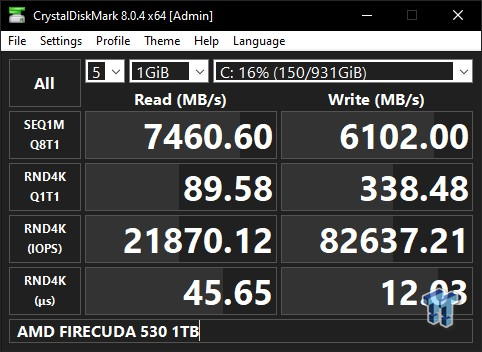
Sequential read speeds are known to be fastest on AMD X570 systems, and ours is delivering jaw-dropping sequential speeds of 7,461/6,102 MB/s. Impressive and proof that Seagate's FireCuda 530 has the best overall sequential throughput of any 1TB flash-based consumer SSD available at this time.
As it did with the FireCuda 520, Seagate has again partnered with Phison Electronics to bring forth the FireCuda 530. Propelling the FireCuda 530 to these record level speeds is a controller we are intimately familiar with, the Phison E18. Phison's E18 controller is by far the most prolific controller in its class, finding its way onto more Gen4 SSDs than any other. However, until now, E18 based retail drives have only been paired with 96Layer Micron flash.
The FireCuda 530 is bit different than the plethora of current E18 based SSDs for a few reasons, most notable of which is its fresh out of the fab 176Layer Micron flash array. This new flash is fast, reaching speeds of 1600 MT/s which really lets the E18 controller eat. Another aspect that differentiates Seagate/Phison collaborations from others is controller firmware exclusive to Seagate. Custom Seagate enhanced firmware is what Seagate did with the FireCuda 520 as well, and that drive did indeed seem to have a little extra sauce as compared with other similarly configured SSDs.
Another difference between the FireCuda 530 and current 1TB-2TB E18 based SSDs with 96Layer flash is controller placement. The E18 controller when paired with 176Layer flash is placed on the center of the PCB between flash chips. A centralized location enables optimal trace lengths, which in theory, at least, makes for more efficient data transfers.
The FireCuda 530 is fresh and new and affords us the perfect opportunity to debut our new SSD testing regimen utilizing a fresh and new Windows 11 Pro OS. Windows 10 is old news and pretty much garbage compared with Windows 11, even in beta form. We find Windows 11 to be superior in every way, including storage performance. Windows 11 is serving up superior storage performance where it matters most, so we feel compelled to make the switch right now.
With a fresh and new theme in mind, we've updated all benchmarks to the latest versions, changed the way we look at certain results, and streamlined others. Additionally, and after much verification through extensive testing, we've decided that a 150GB install accomplishes the same end result as filling the drive to 50%. Turns out what's important is we test as OS disk with data on it. The amount of data we test with makes virtually no difference except in ultra-rare corner case scenarios that are typically outside consumer use case scenarios.
As a final note, before we get into testing Seagate's 1TB FireCuda 530, we will be providing Windows 11 results run on our INTEL Z590 system, and Windows 10 results for the FireCuda 530 run on our AMD X570 system. Benchmark screenshots will be provided for our Windows 11 results.
Drive Details
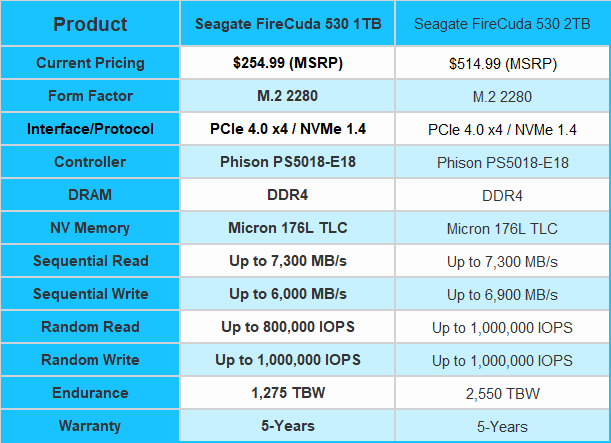
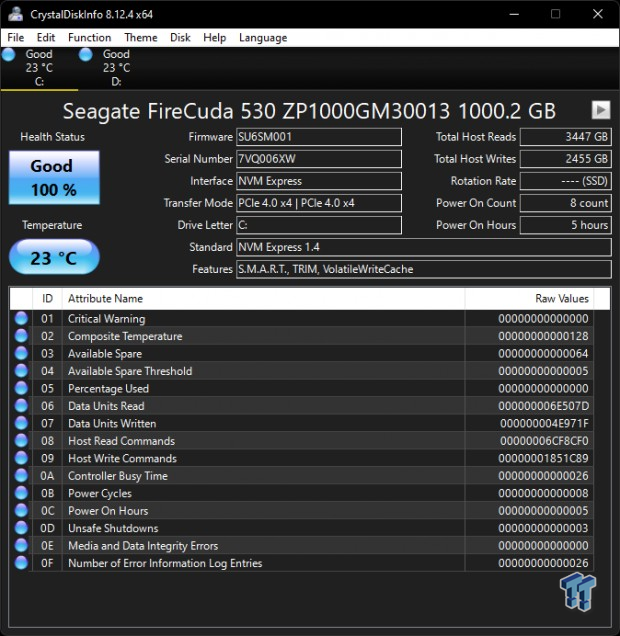
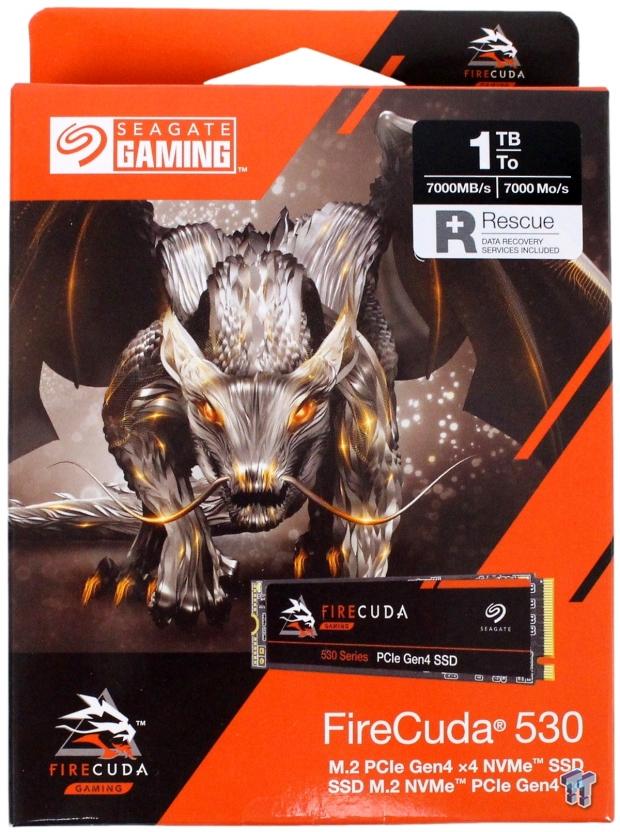
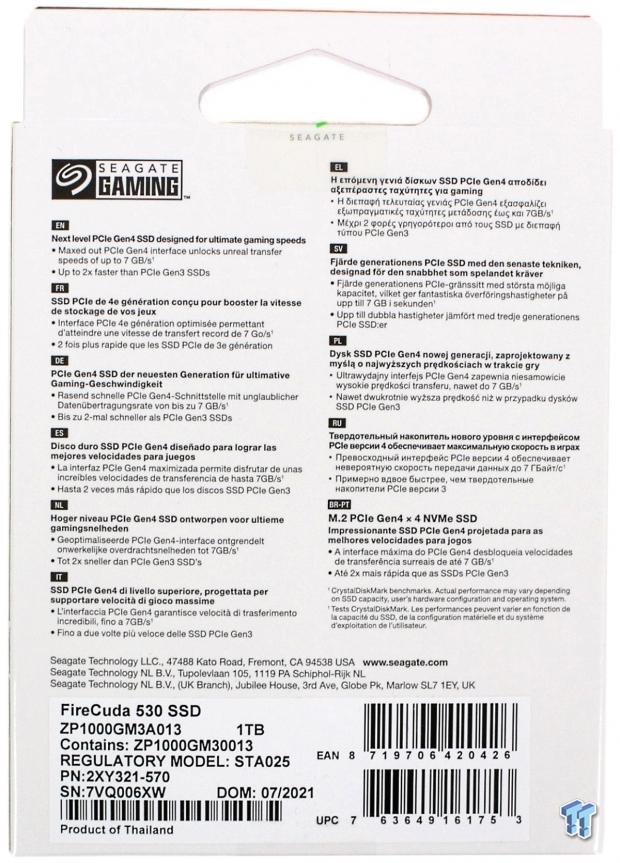


We decided to review the 1TB FireCuda first because it will likely be the best seller of the series. Additionally, it's a preferred single-sided design. A single-sided design can fit into more places than double sided because it is thinner. Also, a single-sided SSD is easier to cool because heat emanates from one side of the PCB.
We notice endurance is up significantly compared to E18 based SSDs with 96Layer Micron flash. In fact, it's nearly double with 176Layer flash. Wow. Alright, time to find out what this bad boy can do for you.
Jon's Test System Specifications
- Motherboard: ASUS ROG Maximus XIII HERO - Buy from Amazon
- CPU: Intel Core i9-11900KF - Buy from Amazon
- Cooler: Alphacool Eissturm Hurricane Copper 45 - Buy from Amazon
- RAM: XPG DDR4 D50 Xtreme 5000MHz 16GB (8GB x 2) - Buy from Amazon
- Video Card: Zotac 2080Ti AMP Edition - Buy from Amazon
- Case: PrimoChill's Praxis Wetbench - Buy from Amazon
- Power Supply: Thermaltake Toughpower GF1 1000W 80+ Gold Buy from Amazon
- OS: Microsoft Windows 10 Pro 64-bit Buy from Amazon

Synthetic Benchmarks: CDM, Anvil, ATTO
CrystalDiskMark
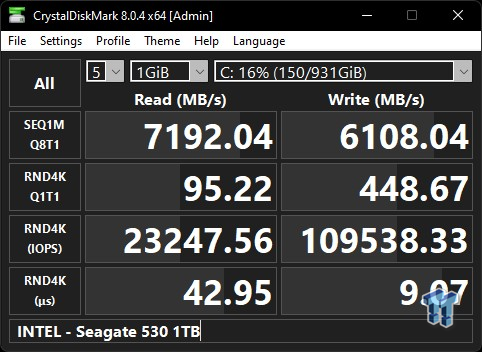
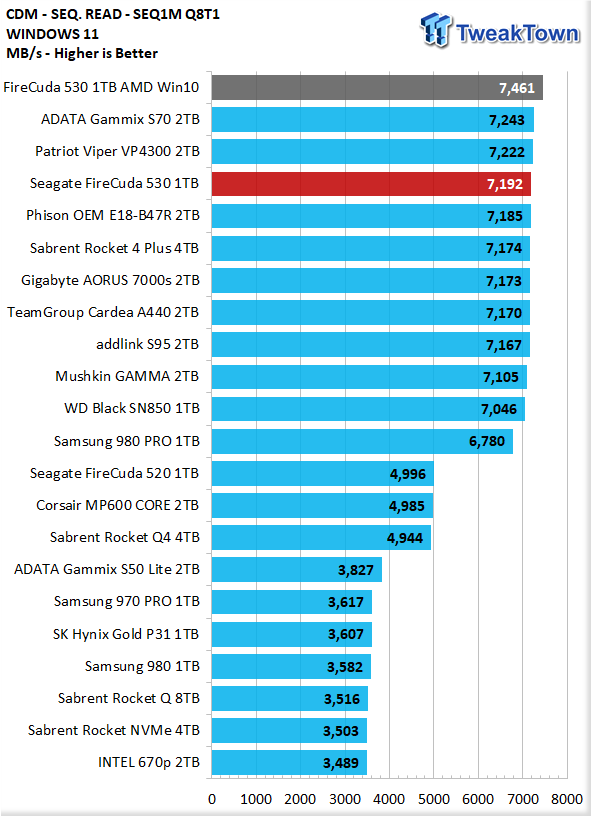
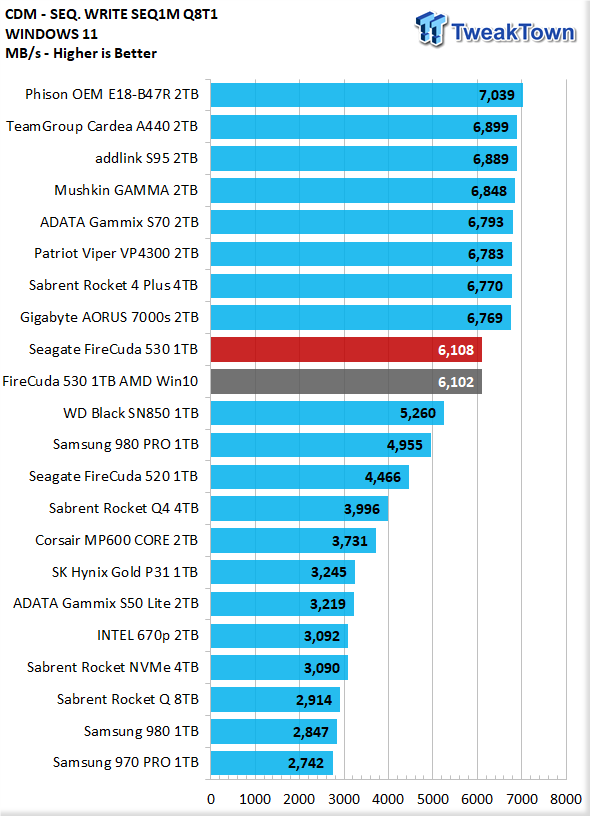
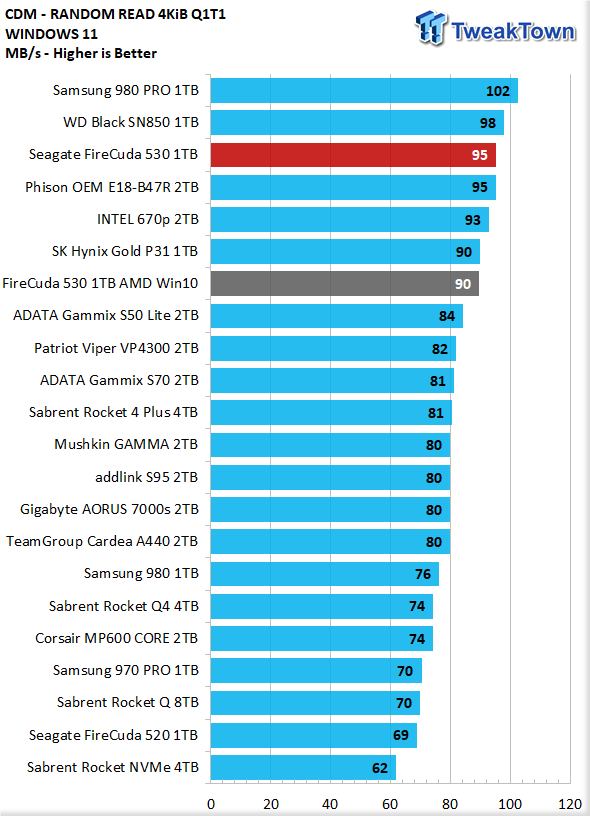
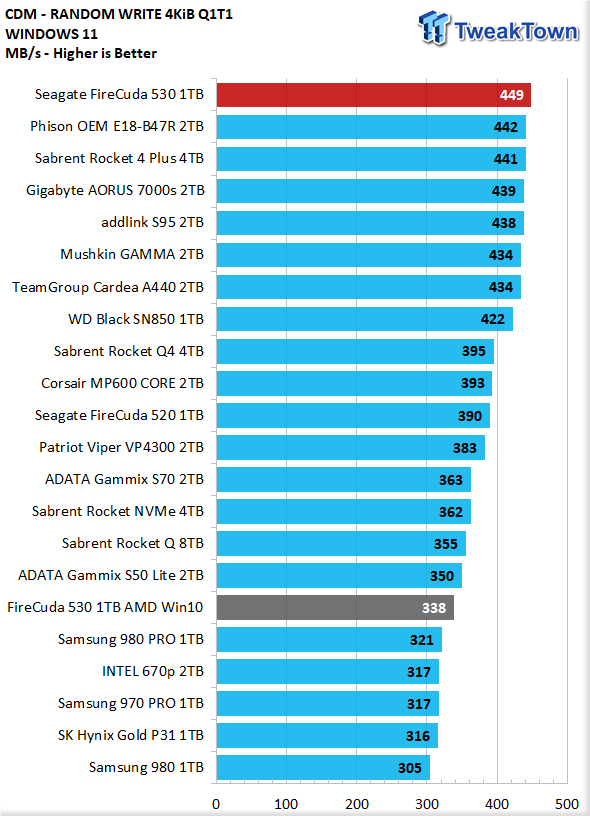
As mentioned previously, and as demonstrated on our charts, the FireCuda 530 does indeed deliver the highest overall throughput for any currently available 1TB consumer SSD. As impressive as these sequential speeds are, we are more impressed with the drive's QD1 random performance.
Anvil's Storage Utilities
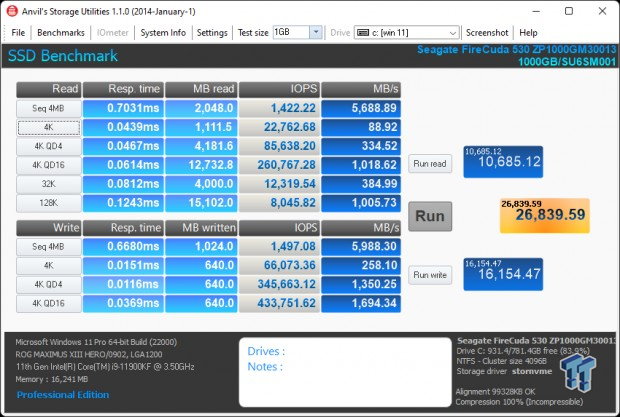
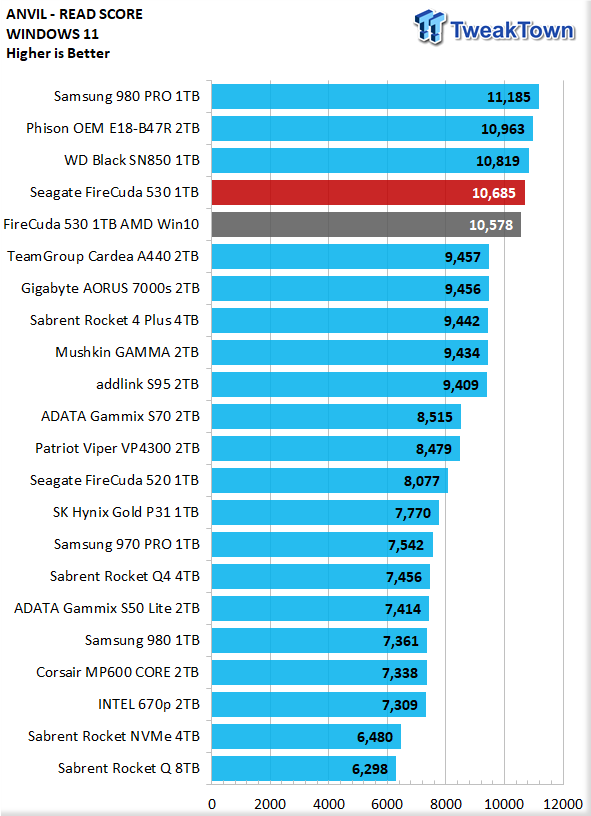
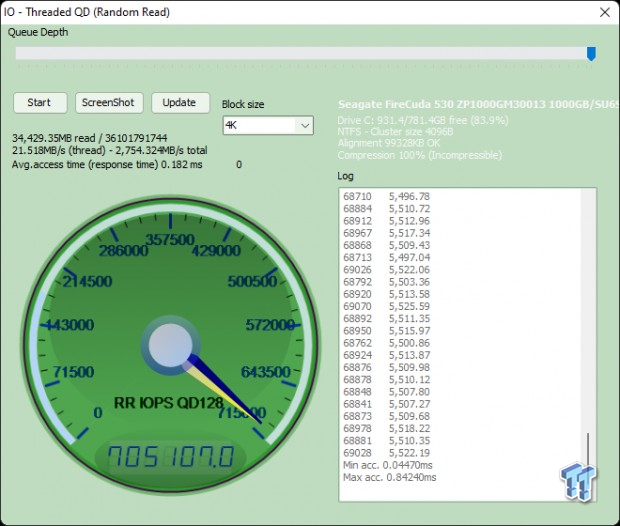
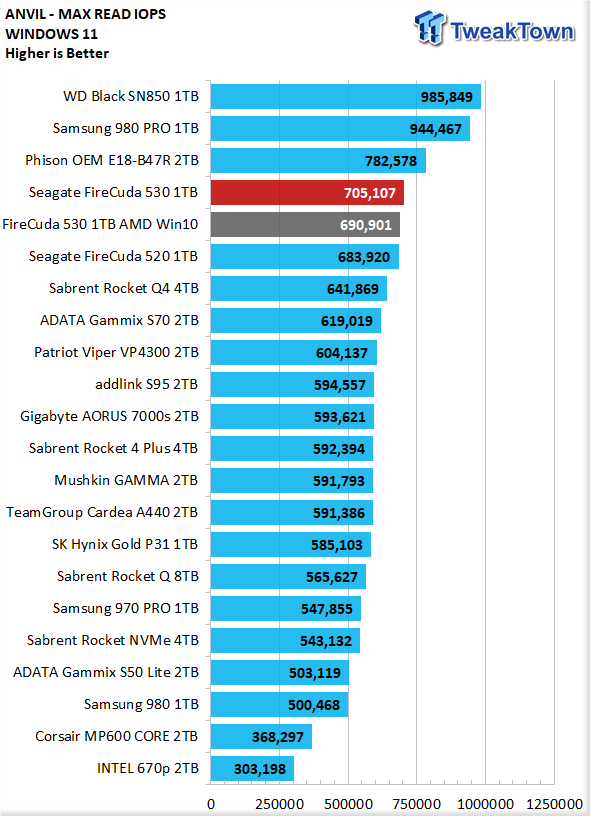
We've always said that our primary focus when looking at Anvil results, or any synthetic results for that matter, is read performance. After all, host reads are 80% of typical consumer data transactions, and as such, it could be said that read performance is 4X more important than programming or writes. With this in mind, we've decided to no longer chart write scoring or total score.
Low queue depth random read performance (up to QD16) is way up on Windows 11, as is random write performance at queue depths of up to 4. This performance where it matters. At the same time, high queue depth (above QD4) random write performance (performance that is practically meaningless for consumer applications) is only half what it is on Windows 10. It's almost as if Microsoft is beginning to focus on performance that matters. This, in a nutshell, is why we are dumping Windows 10 starting today.
Looking at where our test subject sits on our charts clearly demonstrates that it is capable of delivering data to the host as good as anything flash-based we've ever had come across our bench.
ATTO
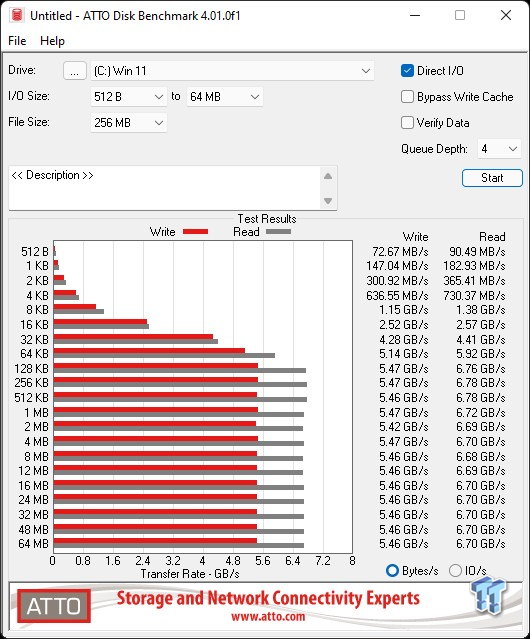
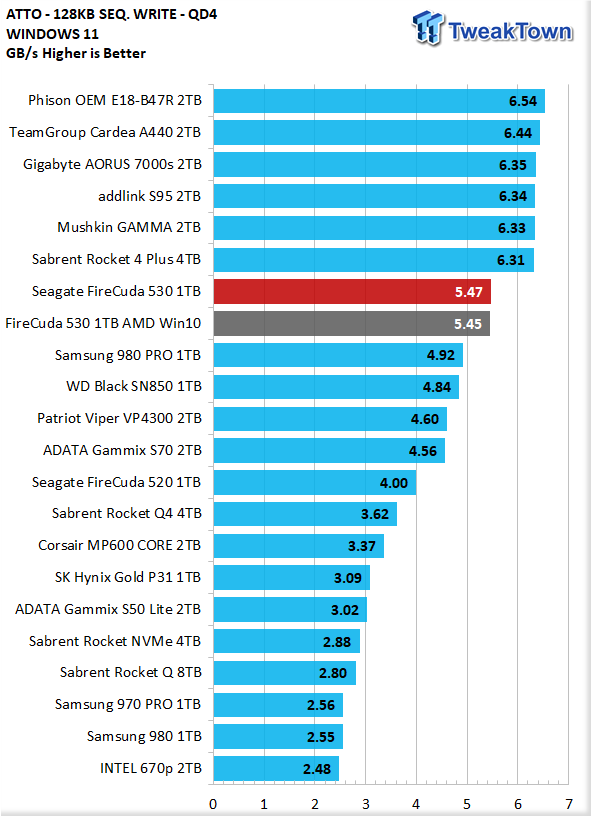
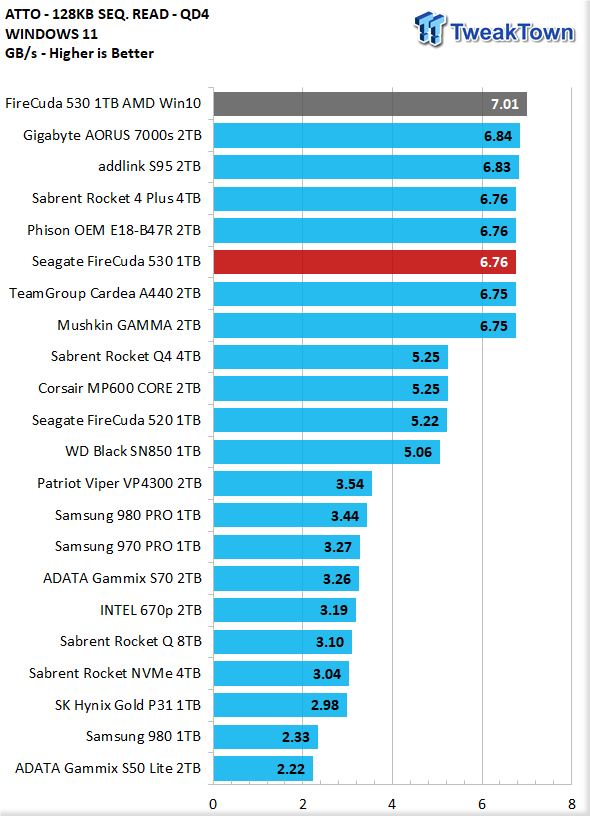
With the newest version 4 of ATTO, we are looking at 128K sequential speeds in GB/s rather than MB/s as we did when using version 3 of this popular storage benchmark. Here again, we get further validation that the FireCuda 530 1TB offers the overall highest throughput of any currently available 1TB flash-based SSD. And again, we are reminded that AMD delivers the best sequential read performance. However, INTEL delivers by far the best overall storage performance, which is why we primarily test storage with INTEL Z590.
Real-World Testing: Transfers, Gaming, PCM10
Transfer Rates
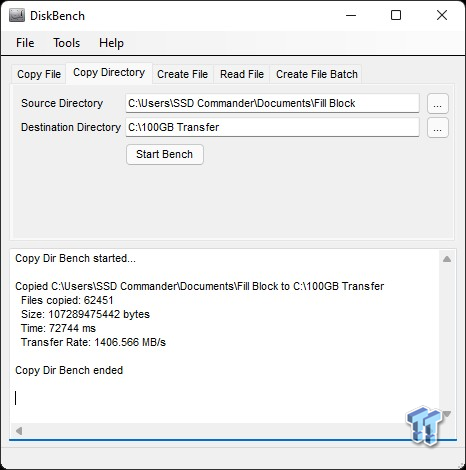
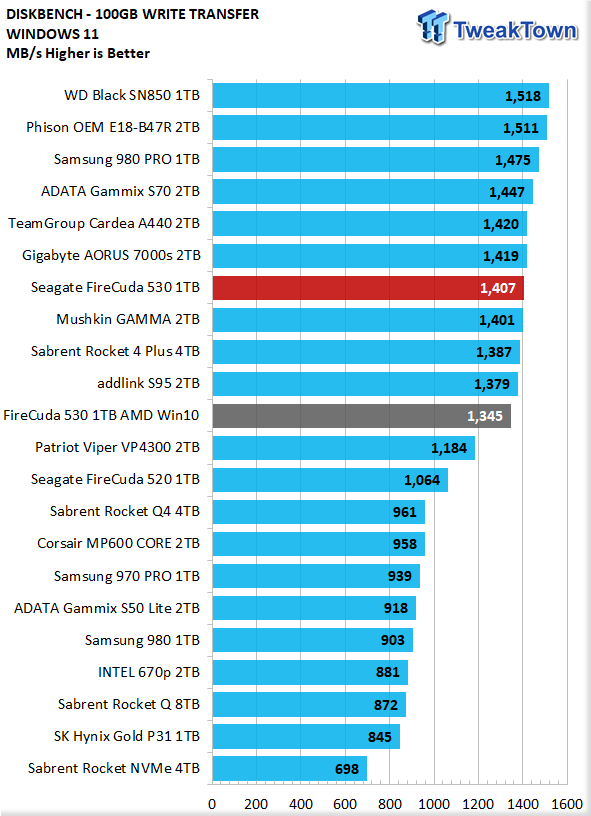
The 1TB FireCuda 530 handles our extremely difficult-to-digest 100GB data block with relative ease, turning in one of the best performances we've gotten from any E18 based SSD regardless of capacity.
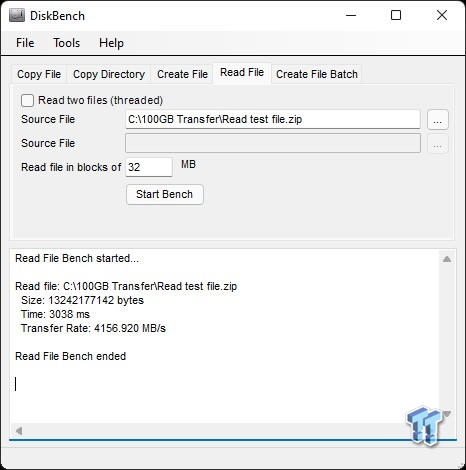
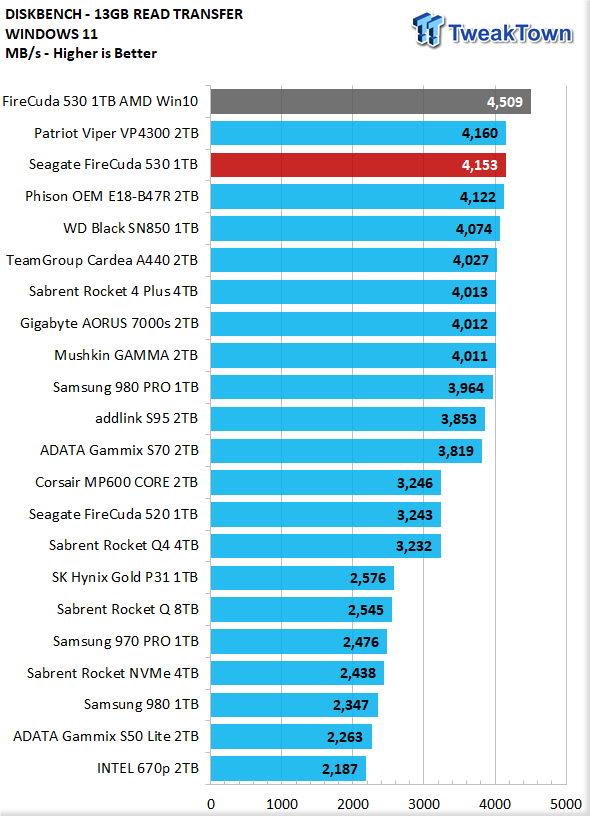
As we alluded to previously, we are far more interested in read performance than write, and here we find the FireCuda 530 1TB delivering the goods big time. The 1TB FireCuda 530 even manages to outdo the higher spec'd 2TB Phison OEM E18 with 176Layer (B47R) flash. Impressive.
Game Level Loading
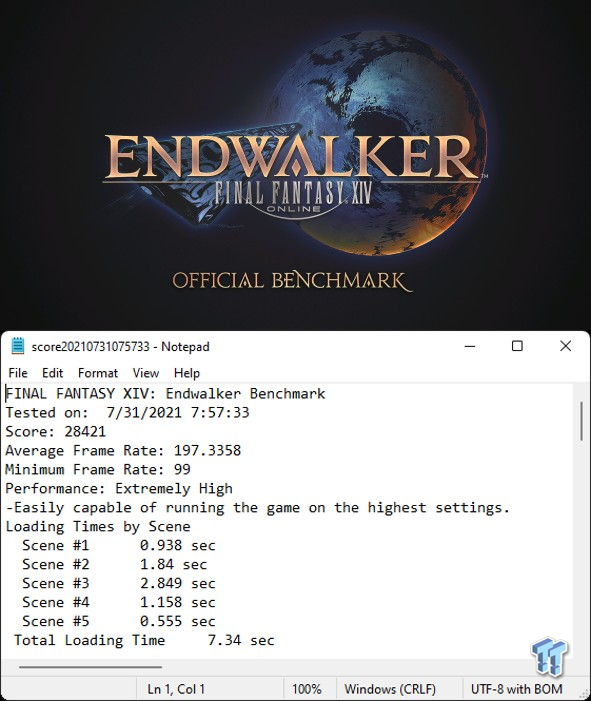
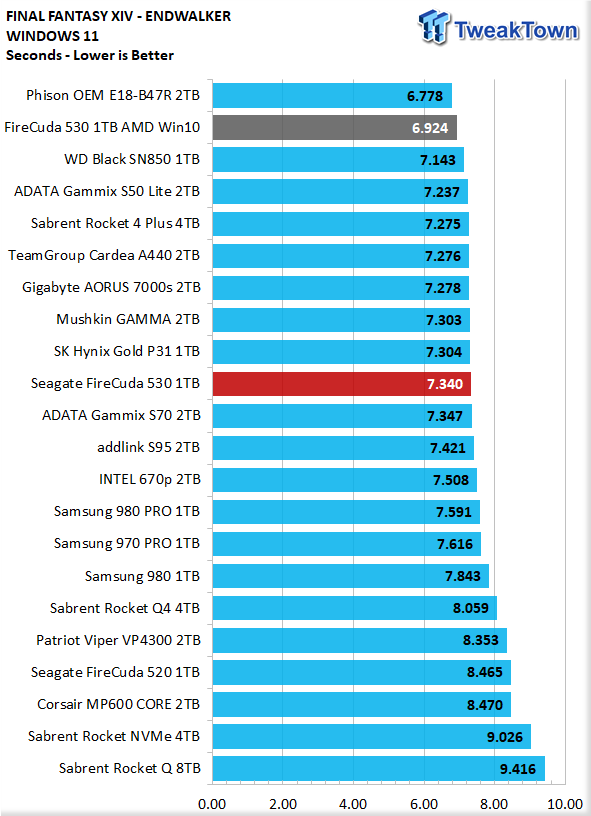
Gaming is a performance metric that matters to the majority of DIY consumers, especially to the enthusiast crowd that TweakTown caters to. The 1TB FireCuda 530 does gaming about as good as it gets, especially running on a high thread count AMD 5900X system. Phison E18 based SSDs populate the top of our gaming chart, with the quickest load time going to those with 176Layer Micron flash. Wow.
PCM10 Storage Tests
PCMark 10 Storage Test is the most advanced and most accurate real-world consumer storage test ever made. There are four different tests you can choose from; we run two of them.
The Full System Drive Benchmark and the Quick System Drive Benchmark. The Full System Drive Benchmark writes 204 GB of data over the duration of the test. The Quick System Drive Benchmark writes 23 GB of data over the duration of the test. These tests directly correlate with mainstream user experience.
PCMark 10 Full System Drive Benchmark
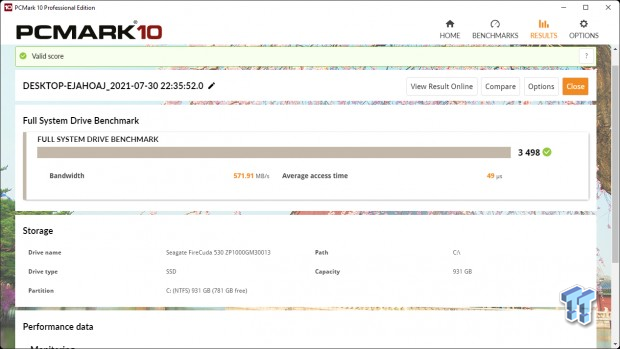
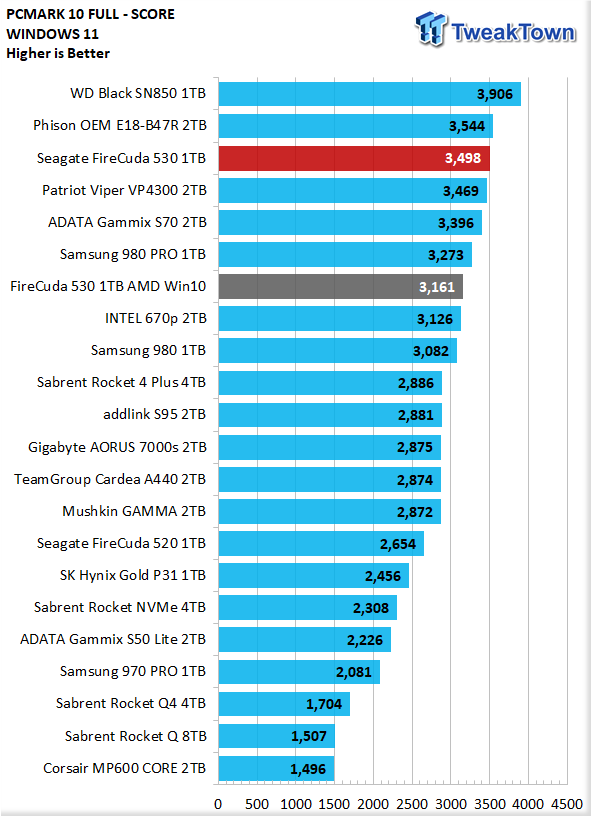
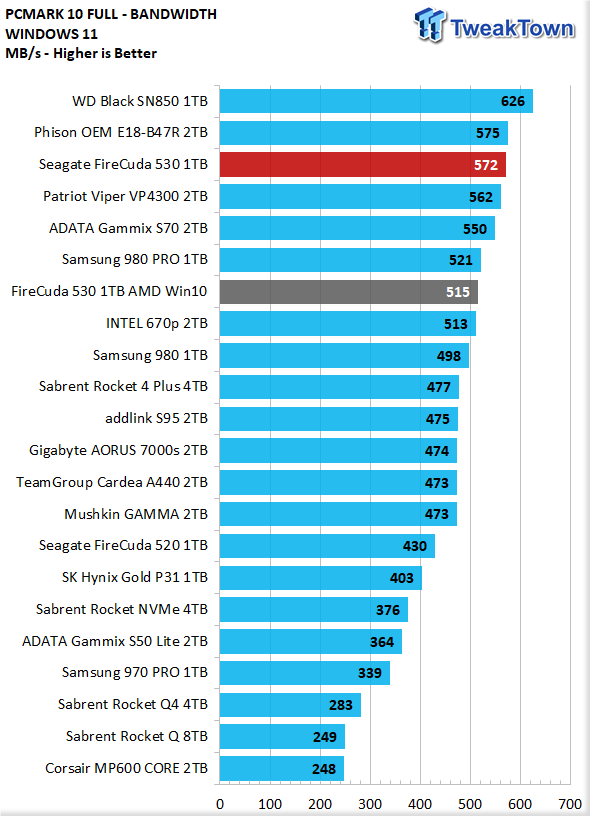
This particular test writes over 204GB data and covers a broad range of common consumer tasks, including booting Windows 10, file transfers, Adobe and Office applications, and startup times for games including Battlefield V, COD Black Ops 4, and Overwatch. Unlike synthetic numbers, this is comprehensive real-world data which is why we use it to rank SSDs in terms of user experience.
Our results here backup our assertion that Intel has the edge over AMD in overall storage performance. The Firecuda 530 1TB exceeds our expectations by essentially delivering the same otherworldly user experience as the higher spec'd 2TB Phison OEM SSD with the same hardware configuration. Elite. Performance where it matters, and performance that is significantly better on Windows 11.
PCMark 10 Quick System Drive Benchmark
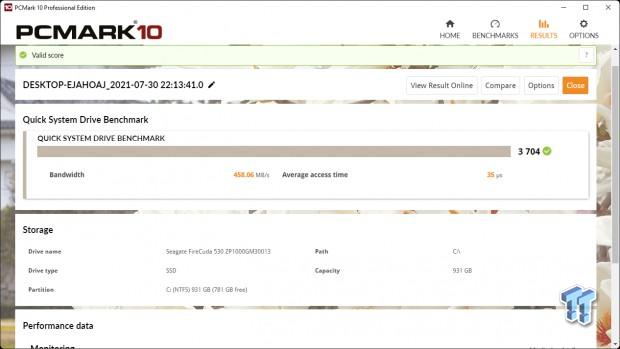
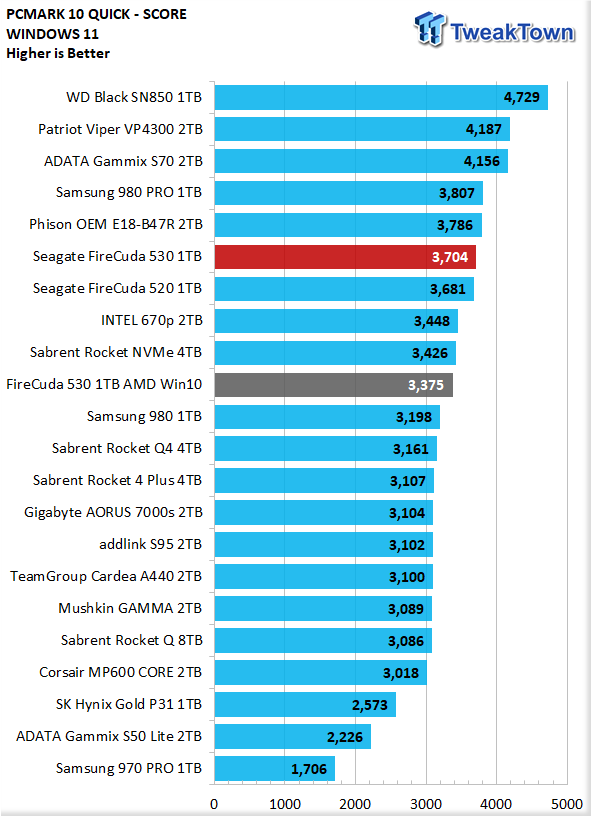
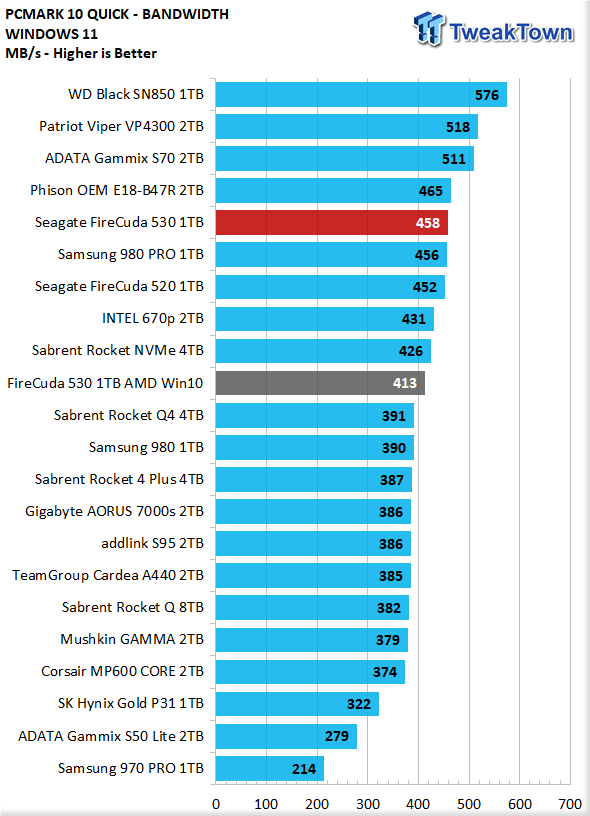
Again, the 1TB FireCuda 530 impresses with performance where it matters most. Anytime a drive scores higher than 3,500 points on this test, we consider it to be Elite. The 1TB FireCuda 530 is an Elite SSD.
Final Thoughts
While seemingly every other SSD retailer jumped on the E18 train early on, Seagate chose to wait for E18 based SSDs to reach their full potential via flash arrays composed of 1,600 MT/s speed flash. Time will tell if this was the way to go or not. The new flash costs a pretty penny, as reflected by the FireCuda's premium pricing. Is it worth it? The enthusiast in us is screaming, hell yeah, it is, but the consumer in us would like to see lower pricing. Ultimately, the market will render its verdict.
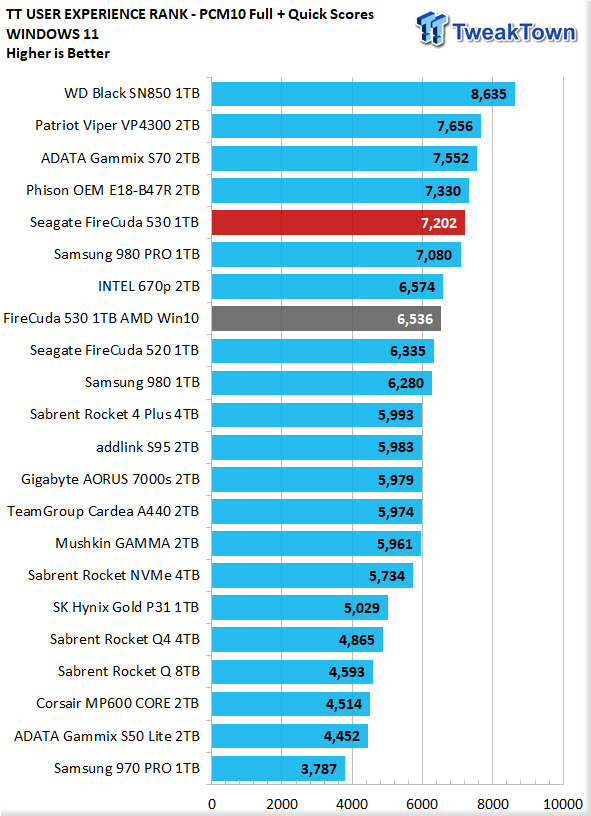
We rank SSDs in terms of overall user experience (performance where it matters most) as expressed by PCMark 10 storage tests. Here again, Seagate's FireCuda 530 1TB demonstrates that it delivers a flash-based user experience that is as good as money can buy. Anytime an SSD can score over 7,000 here, we consider it to be Elite.
Additionally, more data can be gleaned from this chart and summarized as Windows 11 delivers significantly better storage performance than Windows 10. If you are not sure about that, compare any of our benchmark results with any other on the planet, and you will find our assertion to be correct.
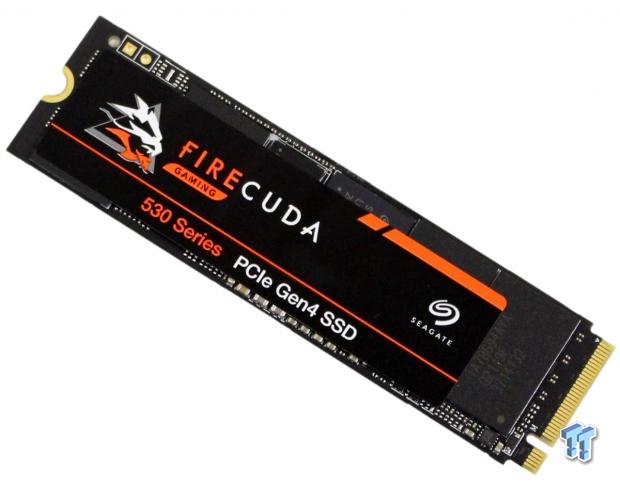
Looking back at our results, we can boil everything down to a few simple statements. Seagate's FireCuda 530 is the overall throughput leader for a 1TB class flash-based SSD. Period. It's also as good as it gets for gaming, so this SSD should be on the shortlist for gamers of all stripes, including PS5 enthusiasts. Finally, and most importantly, the FireCuda 530 proved by its user experience ranking that it is TweakTown elite.
Pros
- Sequential Speeds
- Gaming
- User Experience
Cons
- None

Performance |
100% |
Quality |
100% |
Features |
100% |
Value |
95% |
Overall |
99% |
Seagate's FireCuda 530 1TB SSD proved itself TweakTown elite. Enough said.

What's in Jon's PC?
- CPU: AMD Ryzen 7800X 3D
- MOTHERBOARD: GIGABYTE AORUS Master X670E
- RAM: Kingston Fury Renegade 7200MHz 32GB
- GPU: ZOTAC AMP Extreme GeForce RTX 4090
- SSD: Crucial T700 2TB Gen5
- OS: Windows 11 Pro
- COOLER: Lian Li Galahad 360 AIO
- CASE: Lian Li Lancool III
- KEYBOARD: Corsair K65 RGB Mini
- MOUSE: SteelSeries AEROX 5 Wireless
- MONITOR: ASUS ROG Strix PG27AQN 360Hz 1440p ULMB2
Similar Content
Related Tags

